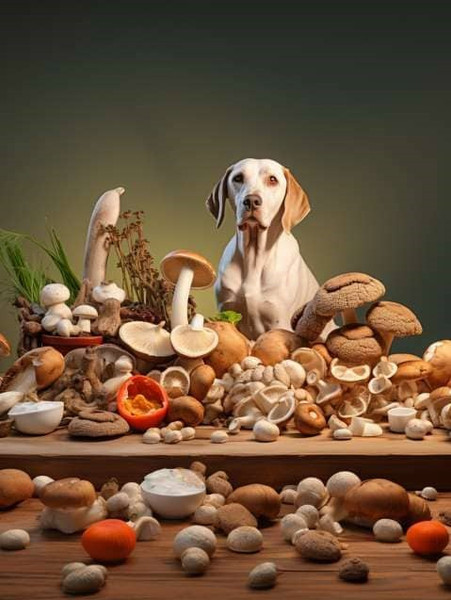Best Mushrooms for Dogs & Cats
Posted by Troy Cosky, Founder FunGuy Grow Supply on 4th Aug 2023

Best Mushrooms for Dogs & Cats: The Benefits of Medicinal Mushrooms for Pets
Curious about feeding mushrooms to your pets? It's essential to know not all fungi are pet-friendly. This comprehensive guide will help you discern which mushrooms are safe for your dogs and cats, how they benefit their health, symptoms of mushroom poisoning, and how to respond in such situations. Let's ensure our beloved companions enjoy the nutritional benefits of the right mushrooms without risking their well-being.
Key Takeaways
- Mushrooms offer health benefits for pets and are packed with nutrients for overall well-being.
- The turkey tail mushroom is a top choice for pets due to its immune-boosting properties and other health benefits.
- Different mushrooms have unique effects, such as reishi promoting hip and joint mobility, turkey tail maintaining genome integrity, and cordyceps mushrooms aiding in liver detoxification.
- It is important to be cautious with mushrooms as not all varieties are safe for dogs, especially wild mushrooms which can pose a significant risk.
The Best Medicinal Mushrooms for Your Pets: A Guide for Dogs and Cats
You're probably wondering how mushrooms can benefit your pets, so let's dive into the world of medicinal mushrooms for dogs and cats. These remarkable fungi, often overlooked in natural healing discussions, are packed with health benefits that can contribute significantly to your pet's overall well-being.
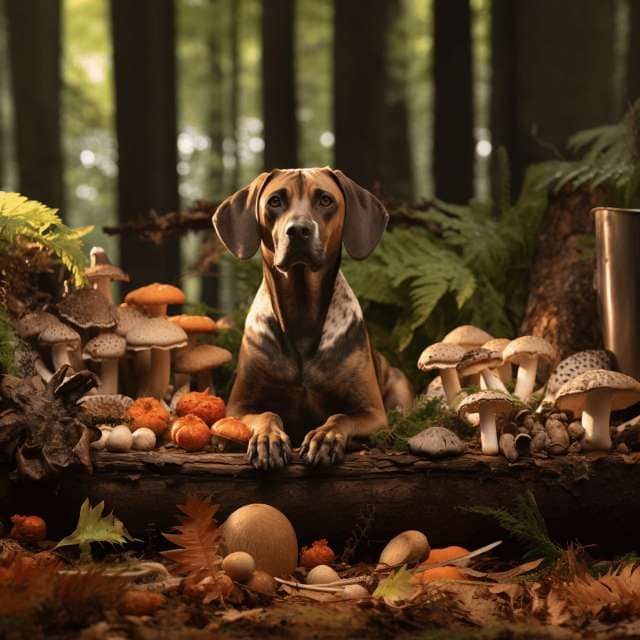
The best mushroom supplement is not a single type but rather an array of different mushrooms that together provide a comprehensive solution. However, if I had to pick one standout star among them all, it would be the turkey tail mushroom for dogs.
Yes, you heard right! The turkey tail mushroom has been used extensively in human medicine for its immune-boosting properties and now it's making waves in the animal health world too. It's one of those natural supplements for dogs that doesn't have any side effects and possesses immense health benefits including aiding digestion and supporting liver function.
Still unconvinced? Well, studies show that using medicinal mushrooms like turkey tail can even help fight cancer cells in dogs. Now imagine combining this superfood with other beneficial mushrooms - we're talking about an immunity powerhouse here!
But remember: Not all fungi are created equal or safe for pets. It's imperative choosing the best mushrooms for health when deciding on a supplement regimen for your furry friend. Always research carefully and consult with a vet before introducing any new substance into your pet's diet.
Next up, we'll take you through the process of selecting the perfect mushroom blend tailored specifically to your dog or cat's needs without causing undue stress or harm. This will ensure they reap all possible rewards from these wonder plants!
Choosing the Best Mushroom for Dogs
It's crucial to pick the right fungi for your pet's specific needs to ensure they reap maximum health benefits. Mushrooms, often considered a medicinal superfood, can offer immense value when it comes to addressing various health issues in pets. However, when thinking about 'best mushrooms for dogs & cats,' you must consider the unique effects of each mushroom on different aspects of their health.
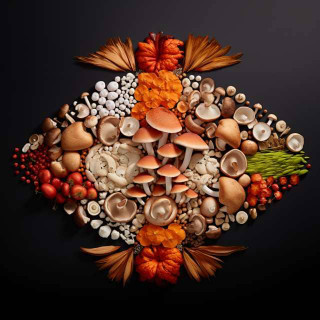
Here are some considerations:
- Reishi mushrooms are known for promoting hip and joint mobility in pets.
- Turkey Tail is excellent for maintaining genome integrity which might be particularly beneficial for older animals.
- Cordyceps can aid in liver detoxification.
- Lion's Mane, popularly used as a nootropic in humans, may help maintain cognitive balance in your furry friend.
Choosing the right mushroom for pets isn't just about picking one and hoping it works; it requires careful consideration of your pet's specific needs. For example, if your dog struggles with allergies, Chaga could provide much-needed support. If pathogen resistance is what you're after, Shiitake may be an excellent choice.
Is mushroom good for dogs? Absolutely! Not only are there mushrooms good for dogs but also fantastic options like King Trumpet that can help calm their nerves. When using medicinal mushrooms such as these or organic turkey tail mushrooms for dogs, it's best to use them in powder form so you can easily mix them into their food.
As we explore more about these wonderful fungi and the potential they hold within our next section 'Can dogs eat mushrooms?', remember that choosing the right species of mushrooms holds paramount importance towards ensuring optimal health benefits.
Can Dogs Eat Mushrooms?
While you might be wondering if your pooch can safely consume fungi, remember that not all types are edible for them. As with humans, mushrooms vary wildly in their effects on dogs. Some can be benign or even beneficial, while others can cause serious harm.

Can dogs eat mushrooms? Yes and no. It depends on the type of mushroom. Store-bought varieties used for human consumption – such as button mushrooms or portobellos – are generally safe, assuming they are unseasoned and organic to prevent any potential ingestion of harmful chemicals or spices. So when it comes to these kinds of 'safe' mushrooms, dogs can indeed enjoy them.
As pet owners, we are always in pursuit of ways to enhance the health and longevity of our pets. According to Chase Roseberry, an author at BuzzPetz, certain mushrooms for dogs can offer health benefits that can contribute to their youthfulness, activity, and overall quality of life. His research, available on the BuzzPetz website, is a fantastic resource for pet owners looking to incorporate natural and safe options into their pet's diet.
However, this isn't a green light for your dog to start gobbling up any mushroom they find outdoors. Wild mushrooms pose a significant risk because many species are toxic, causing everything from mild upset stomachs to fatal poisoning in pets. If your dog ate a mushroom found outdoors, you should contact your vet immediately.
The tricky part about wild mushrooms is that they're incredibly difficult to identify correctly; even experts sometimes get it wrong. That's why you should treat every wild mushroom as potentially dangerous - better safe than sorry when it comes to dogs and mushrooms.
If you notice any wild mushrooms growing in your garden or anywhere on your daily walks with your furry friend, make sure to remove them promptly or steer clear entirely. So next time my dog ate a mushroom crosses your mind, remember: the supermarket kind is fine but steer clear from the wild ones for both dogs and cats alike.
Now let's delve into which specific varieties hold potential benefits without posing risks to our beloved companions' health.
Safe Mushroom Varieties for Pets
Let's explore some mushroom varieties that are not only safe but also beneficial for your pets' health. Shiitake, Reishi, Cordyceps, Maitake, Lion's Mane, Turkey Tail, and Chaga mushrooms are all examples of dog mushrooms that can contribute to their overall well-being.

Shiitake mushrooms (Lentinula edodes), known as the 'Elixir of Life' in Japan, provide a spectrum of nutrients such as vitamins and minerals. On the other hand, Reishi mushrooms (Ganoderma lucidum) are touted as the 'Mushroom of Immortality'. They support healthy immune function and help maintain energy levels in your pet.
Below is a table showcasing some benefits of these mushroom varieties:
| Mushroom | Benefits |
|---|---|
| Shiitake | Support blood sugar levels; rich in protein |
| Reishi | Strengthen immune system; support energy levels |
| Cordyceps | Maintain liver and kidney function; improve endurance |
| Maitake | Support cellular activity; aid liver health |
| Lion's Mane | Support digestive tract health; enhance cognitive function |
These safe mushroom varieties for pets add variety to their diet while offering numerous benefits. For instance, incorporating the best mushroom powder into your pet's diet can help maintain their liver function (as seen with Maitake mushrooms) or even support cognitive function in senior pets (like Lion's Mane mushrooms).
You might be wondering about the connection between dogs & cats and Turkey Tail or Chaga mushrooms. Well, studies have shown that these types of dog-friendly mushrooms can support immune system function and healthy cellular activity!
Remember though! While certain types of fungi offer significant benefits when it comes to dogs & cats eating them like supplements – not all kinds do! In our next section, we'll talk about what happens if your pet eats a poisonous mushroom.
Symptoms of Mushroom Poisoning in Dogs
You've got to be vigilant because the symptoms of mushroom poisoning in your pets can manifest quickly or may take up to a day or two to appear. The clinical signs of mushroom poisoning in dogs and other pets are quite varied and distressing. Dogs that have ingested poisonous mushrooms may begin drooling excessively, vomiting, or experiencing diarrhea. Your pet could also suffer from abdominal pain, weakness, lethargy, abnormal heartbeat patterns, or struggle with their breathing.
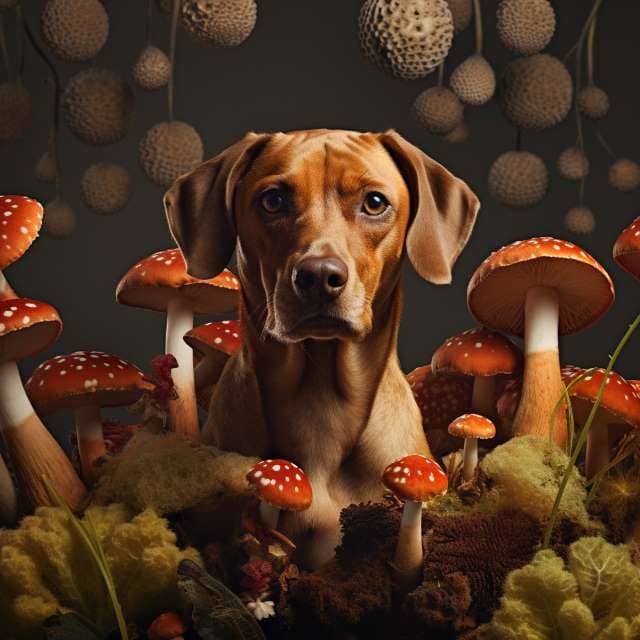
In more severe cases of toxic mushrooms to dogs ingestion, you might even notice your pet having uncoordinated movements as if stumbling around aimlessly. Worse yet is the disorientation that can come with this toxicity – it's heartbreaking to watch a beloved pet so confused and scared. One symptom not to overlook is an increase in drinking and urinating frequency - this could be a sign of damage to the liver or kidneys caused by these harmful fungi.
If your dog ate a mushroom during its curious exploration outside, immediately take note of any yellow discoloration appearing on its gums and eyes – a potential sign of jaundice indicating liver damage. Don't miss out on noticing tremors or seizures which could be indicative of serious neurological effects due to mushroom poisoning.
Remember that there is no simple test for determining whether mushrooms toxic to dogs have been consumed. So if you're ever unsure "My dog ate mushrooms...are they safe?" treat all unknown mushroom ingestions as potentially lethal situations requiring immediate veterinary attention.
As we move forward discussing feeding safe varieties of mushrooms for your pets' health benefits, keep these symptoms firmly in mind ensuring their safety always comes first.
Feeding Mushrooms to Your Pet
Incorporating medicinal fungi into your pet's diet can provide them with a host of health benefits. However, it's vital to remember that not all mushrooms are safe for pets; some are poisonous to dogs and cats. As a responsible pet owner, you need to discern which types of mushrooms are beneficial and which could potentially harm your beloved furry friend.

Here are four key points to consider when feeding mushrooms to your pet:
- Understand the Risks: It's crucial to know about mushrooms poisonous to dogs and cats. Some wild varieties can cause severe symptoms like vomiting, seizures, or even death in pets.
- Choose Medicinal Mushrooms: Not all dog mushroom supplements are created equal. Opt for medicinal ones known for their health benefits such as boosting immunity, reducing inflammation, or promoting vitality.
- Avoid Fillers: Beware of cheap products filled with grain and other fillers instead of actual mushroom extract. These may be bad for dogs and do not provide the full range of benefits.
- Select Quality Products: Look for reputable brands committed to producing high-quality mushroom extracts without harmful substances.
Feeding your pets with these remarkable fungi is more than just about avoiding dangers like mushroom toxicity in dogs or cats eating poisonous mushrooms—it's about tapping into the extensive medicinal mushrooms' benefits that nature has provided us.
As we continue exploring this subject matter further, let's delve into an exciting aspect: powerful medicinal mushrooms promising astounding health rewards for our four-legged companions!
Powerful Medicinal Mushrooms for Pet Health
There's a world of potent medicinal fungi out there that can significantly enhance your pet's health. Packed with beneficial properties, these mushrooms are particularly advantageous for dogs and cats. The list includes Reishi, Shiitake, Maitake, Turkey Tail, and Cordyceps - all of which have proven to be powerful medicinal mushrooms for pet health.
| Mushroom | Beneficial Properties |
|---|---|
| Reishi | Anti-inflammatory, antiviral, boosts immune system |
| Shiitake | Stimulates white blood cells, improves circulation |
| Maitake | Stimulates T-cells, inhibits tumor growth |
| Turkey Tail | Boosts immune response; liver toxicity is rarely observed as a side effect |
| Cordyceps | Exhibits antifungal and antibacterial properties |
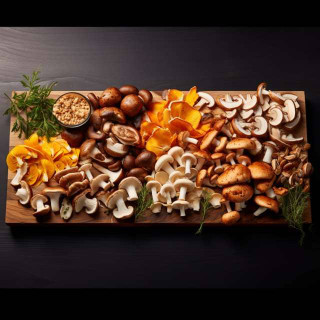
Notably among the best mushrooms for dogs & cats are the Turkey Tail mushrooms. They're rich in beta-glucan polysaccharides that stimulate the immune system in combating infections and diseases. Studies have shown turkey tail mushroom side effects are minimal while its benefits include longer survival times in dogs with hemangiosarcoma - a common form of liver cancer in dogs symptoms of which include lethargy and loss of appetite.
However beneficial these many medicinal mushrooms may be though it's important to remember they're not without their disadvantages. Always start with a lower dose to prevent digestive upset or any potential turkey tail mushroom liver toxicity.
Incorporating these mushrooms into your pet's diet can provide significant health benefits but it's equally crucial to be aware of potentially harmful varieties. As we delve deeper into exploring this fascinating kingdom of fungi in our next section about 'toxic wild mushrooms for dogs', you'll discover why sourcing from reputable suppliers is key to ensuring safety alongside health advantages.
Toxic Wild Mushrooms Poisonous to Dogs
While it's crucial to know about beneficial fungi, it's equally important to understand the risks associated with certain toxic wild varieties your pooch might encounter. Not all wild mushrooms are safe to eat, and some can cause severe harm or even be fatal for your furry friend. Therefore, it's vital to be aware of the potential dangers.

- Amanita phalloides, colloquially known as "death cap," is one of the most dangerous species. It emits a fishy odor that may attract curious dogs.
- The Galerina marginata or "deadly Galerina" is another highly toxic variety that can severely affect your dog's health.
- The Amanita gemmata, also known as "jeweled deathcap," shouldn't be confused with healing mushrooms like defenders mushroom; they're extremely harmful.
- Lastly, both Inocybe spp. and Clitocybe dealbata mushrooms are also poisonous for dogs.
Remember, even if you're familiar with raw mushrooms from using them in cooking or taking the best mushroom powder supplements yourself, don't assume you can safely identify edible and non-edible varieties in the wild - leave that to professional mycologists.
When it comes to better mushrooms for your pet's consumption, always stick with store-bought options or those recommended by veterinarians rather than picking something out on a nature walk. It's not worth risking their lives over what could just be a harmless curiosity about new scents and textures.
Our pets depend on us for their safety and well-being; let's ensure we do right by them by keeping our knowledge updated about toxic wild mushrooms for dogs. Next up: what should you do if your pet has ingested a potentially dangerous mushroom?
Treating Mushroom Poisoning in Pets
If your pet has ingested a potentially harmful fungus, you'll want to act promptly to reduce the damage as much as possible. You might have to put mushroom identification on hold because decreasing the stomach's mushroom absorption is the top priority. Even if your pet was eating raw mushrooms, veterinarians are not mushroom experts and may need to research the type based on your samples and photos once your dog is stable.

Within two hours of ingestion, decontamination can be achieved by inducing vomiting at the hospital. If it's too late for this, activated charcoal can be given to bind any additional toxins in their stomach.
| Treatment | Description | Usage |
|---|---|---|
| Vomiting | It helps eliminate unabsorbed toxins | Within 2 hrs of ingestion |
| Activated Charcoal | Binds remaining toxin in stomach | After vomiting |
| Outpatient Care | Symptomatic treatment for vomiting and diarrhea | For less toxic mushrooms or smaller amounts eaten |
| Hospitalization | Hydration support with IV fluids & supportive care | For unidentified or highly toxic shrooms |
| Medications | To manage symptoms like muscle twitching, seizures & provide liver-support | As needed |
Unfortunately, there's no specific antidote for mushroom poisoning in dogs. The approach varies depending on what mushrooms they ate and how much they consumed. Some dogs may need outpatient care for symptoms like vomiting and diarrhea while others might require hospitalization especially if they've consumed a highly toxic variety or an unidentified one.
Medications will be provided for symptomatic relief including muscle twitching and seizures; liver-support drugs could also be part of this therapy even if immediate signs of illness aren't apparent in your dog.
Next up: let's discuss whether store-bought varieties fall into the category of safe mushrooms for pets.
Can Dogs Eat Store-Bought Mushrooms?
You might be wondering whether the mushrooms you pick up from your local grocery store are safe for your furry friend to consume. According to Dr. Justine A. Lee, a renowned veterinary professional, the answer is generally yes - but that comes with some important caveats.

- Avoid Oils and Seasoning: The way we typically prepare mushrooms isn't dog-friendly. We love our sautéed mushrooms doused in oil or butter and sprinkled with salt and other seasonings, but these can be harmful to dogs. High-fat foods like oils and butter can lead to pancreatitis in dogs, which is a painful condition that requires immediate veterinary attention.
- Watch Out for Harmful Vegetables: Garlic and onions are toxic to dogs, so if these ingredients are mixed with your store-bought mushrooms, they become unsafe for canine consumption.
- Mushrooms Are Not Essential: It's worth mentioning that while certain types of store-bought mushrooms aren't inherently dangerous for dogs, they don't need them in their diet either. Dogs get all the necessary nutrients from a balanced diet of high-quality commercial pet food.
While it may seem tempting to share your mushroom dish with your four-legged companion given their puppy-dog eyes at dinner time, it's best not to indulge them. Instead, opt for safer rewards such as carrot sticks or slices of apple — these won't pose any risks and will keep them just as happy!
In light of the above information about potential threats related to feeding pets with store-bought mushrooms, we should consider exploring what benefits pets could possibly derive from certain types of fungi - something we will delve into in our subsequent section on 'health benefits of mushrooms for pets'.
Health Benefits of Medicinal Mushrooms for Dogs and Cats
Let's delve into the potential health advantages your furry friends might gain from certain types of fungi. Mushrooms, specifically those rich in Beta-D-glucan polysaccharides, are potent allies in combating cancer and enhancing immune systems. These remarkable properties have been studied extensively in mice, humans, and rats.
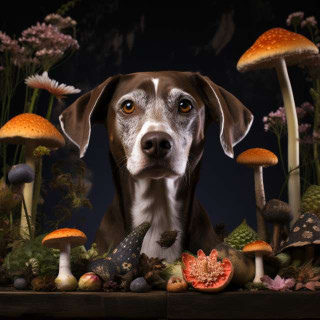
But what about our beloved pets? Anecdotal evidence for mushrooms' benefits to dogs and cats is sparse but promising. In a 2012 Penn State study focused on dogs with invasive blood cell cancer, treatment with a compound derived from the Yunzhi mushroom resulted in unprecedented survival times.
The array of medicinal mushroom benefits for us humans includes improved cognitive function, cardiovascular health enhancement, gut stimulation, anti-microbial attributes as well as anti-inflammatory, immunomodulatory antioxidant qualities. They're even utilized in skincare products! However, when it comes to our pets, these advantages are not fully comprehended yet.
Remember though – not all mushrooms are created equal! Some varieties along with certain vitamins and minerals can be toxic to your pets. Always consult with your veterinarian before introducing any new supplements into their diet.
Research is ongoing about the potential health benefits that mushrooms can provide for our pets. It's crucial to keep yourself informed and always make decisions prioritizing your pet's well-being above all else. As we transition into discussing the conclusion of this topic, remember: when it comes to your pet's health—knowledge is power—and there's no such thing as knowing too much when their lives are at stake.
Final Thoughts: Proper Use of Medicinal Mushrooms in Pet Care
In wrapping things up, it's vital to remember that while medicinal mushroom supplements may offer health benefits, their use in pets demands careful consideration and veterinary guidance. The popularity of these products has grown recently due to the potential immune-boosting and anti-inflammatory properties they provide. However, using these supplements comes with its share of risks especially if not sourced or administered correctly.

Remember, this information is meant to enhance your understanding rather than replace professional veterinary advice. If you're considering incorporating medicinal mushrooms into your pet's healthcare routine, it's essential to engage a reputable brand known for high-quality ingredients and strict manufacturing practices.
Before you start administering these supplements, make sure you consult with your vet. Your furry friend's specific health needs and conditions should dictate the appropriate dosage—your vet is best placed to guide you on this matter. They will also help monitor any possible side effects or clashes with other meds your pet might be on.
Just as important is exploring alternative treatment options before turning to medicinal mushroom supplements. While these might offer certain benefits, there could be other treatments better suited for addressing your pet's particular needs effectively.
So yes, medicinal mushroom supplements for dogs and cats can potentially benefit their health in many ways; however, their usage requires caution and consultation with a qualified veterinarian who can give accurate information regarding potential risks and benefits tailored specifically for your beloved companion. Always keep their well-being at heart when making such decisions; after all, they rely on you entirely for their care.
Take the Next Step Towards Your Pet's Wellness with FunGuy Mushroom Supply
Embrace the healing potential of medicinal mushrooms for your dogs and cats. Explore FunGuy's premium mushroom grow kits to cultivate the best mushroom supplements right at your home. Keep your furry friends healthy, happy, and strong. Check out our mushroom grow kits now!
Frequently Asked Questions

Can dogs eat mushrooms?
To ensure the safety of your furry friend, it's important to know whether dogs can safely consume mushrooms. While some mushrooms are fine for dogs to eat, it's crucial to exercise caution and avoid any wild mushrooms.
Here are a few key points to consider when it comes to dogs and mushrooms:
- Toxicity: Many wild mushrooms can be incredibly poisonous for dogs, making it essential to keep them away from these varieties. The difficulty in distinguishing between safe and toxic mushrooms makes it best to err on the side of caution.
- Store-bought Mushrooms: Dogs can eat mushrooms that you buy from a supermarket or shop, as long as they are organic, unseasoned, and raw. These types of mushrooms pose no harm to your pet when given in moderation.
- Garden Safety: If you notice any wild mushrooms growing in your garden, promptly remove them. This precautionary step ensures that your dog won't accidentally ingest something harmful while exploring the outdoors.
- Veterinary Assistance: If you suspect that your dog has consumed a wild mushroom or is experiencing any unusual symptoms after eating store-bought ones, contact your vet immediately for guidance and assistance.
Understanding the risks associated with dogs eating mushrooms sets the stage for exploring whether these fungi are bad for our beloved companions.
Are mushrooms bad for dogs?
Keep in mind that mushrooms may not be beneficial for your dog's health. While store-bought mushrooms aren't toxic to dogs, they don't offer many nutritional benefits either.
Instead, there are other fruits and vegetables that you can feed your pup as healthy snacks, such as blueberries, broccoli, or green beans.
However, it's important to note that many wild mushrooms can be poisonous to dogs. Therefore, it's crucial to monitor your yard for any mushroom growth and supervise your dog during outdoor activities.
If you happen to see your dog eat a wild mushroom, it's essential to take immediate action. Collect a sample of the mushroom and bring it to your veterinarian so they can properly identify its species and determine the potential risks involved. If your dog has consumed the entire mushroom, provide a detailed description of its appearance and the surroundings where it was found.
Mushroom poisoning in dogs can lead to various symptoms such as vomiting, diarrhea, abdominal pain, confusion, tremors, seizures, or even organ failure. Some specific types of mushrooms, like turkey tail mushrooms, can have detrimental side effects on dogs' health.
How to tell if mushrooms are bad?
If the mushrooms you're selecting have bruises, dark spots, or appear slimy and wet, they are starting to go bad. To ensure you're picking the freshest mushrooms, here are some key indicators to look out for:
- Dry and plump surfaces: Fresh mushrooms should appear dry and feel firm when touched. Avoid ones that seem moist or soft.
- Color consistency: Mushrooms should be their usual color without any noticeable darkening. If they appear darker than usual, it could indicate spoilage.
- Closed veil under the cap: For a delicate flavor, opt for mushrooms with a closed veil underneath the cap. This indicates freshness and tenderness.
- Exposed gills and open veil: If you prefer a richer taste, choose mushrooms with an open veil and exposed gills. These signify maturity and robust flavors.
- Intended use: Not all less-than-perfect-looking mushrooms need to be discarded. Consider how you'll be using mushrooms – fresh in a salad or cooked in soup? In some cases, slight imperfections might not impact their usability.
Can you eat mushrooms raw?
Have you ever considered trying raw mushrooms and wondered if it's safe to eat them this way? Well, the good news is that all fresh mushrooms available at grocery stores or markets are safe to eat either cooked or raw. So yes, you can eat mushrooms raw if that's your preference.
Raw mushrooms like white mushrooms, cremini, portabellas, and enoki are commonly enjoyed in salads or with dip. They can be a convenient option since they don't require any cooking. However, keep in mind that the taste and texture of raw mushrooms might be different from what you're used to. They have a spongy texture compared to their cooked counterparts and a stronger, earthier taste.
For larger raw mushrooms like creminis or portabellas, it's recommended to remove the stems as they can be tough to chew when eaten raw. Additionally, make sure to give all mushrooms a quick wipe down or rinse before eating them to remove any dirt or substrate.
Can dogs eat cooked mushrooms?
Cooked mushrooms can be safe for dogs to eat, but it's important to avoid any added extras like salt, onions, or garlic that could make them sick. While shop-bought mushrooms cooked in a small amount of olive oil are generally fine for dogs, meals containing mushrooms often include ingredients that are toxic to dogs. Instead of sharing your plate with your furry friend, consider cooking mushrooms separately for them.
When feeding cooked mushrooms to your dog, remember these important points:
- Keep it plain: Avoid adding any seasonings or flavorings like salt, onions, or garlic.
- Stick to moderation: Offer mushrooms as an occasional treat rather than a regular part of their diet.
- Observe closely: Watch out for any signs of discomfort or illness after your dog has eaten mushrooms.
It's crucial to note that not all mushrooms are safe for dogs. Some wild varieties can be highly toxic and cause severe health issues if ingested. If you suspect your dog has consumed a wild mushroom or is showing symptoms such as vomiting, diarrhea, or lethargy after eating any type of mushroom, seek veterinary attention immediately.
Are mushrooms good for dogs?
Mushrooms can provide dogs with vitamins, minerals, and antioxidants. They contain vitamins B and D, which are essential for your dog's overall health. Additionally, mushrooms are low-calorie and have no fat or cholesterol, making them a healthy treat option. They also contain very little salt, which is beneficial for dogs who need to watch their sodium intake. However, it is important to note that not all mushrooms are safe for dogs to consume. Some varieties can be toxic and lead to mushroom toxicity in dogs.
When feeding mushrooms to your dog, it is crucial to ensure they are cooked thoroughly. Raw mushrooms may be difficult for dogs to digest and could potentially cause an upset stomach. By cooking the mushrooms properly, you can eliminate any potential risks associated with raw consumption.
While mushrooms are good and can provide some nutritional benefits for your furry friend, it's important to remember that they should not be given as a supplement to their regular diet. A complete and balanced dog food should already provide all the necessary nutrients they need.
Can cats eat mushrooms?
If you're concerned about the safety of feeding mushrooms to your cat, rest assured that it is generally safe for them to consume. However, it is recommended to feed them cooked mushrooms rather than raw ones as they are easier for cats to digest. Raw mushrooms may also carry a risk of contamination from raw meat, dairy products, or toxins that could potentially harm your feline friend.
When it comes to mushroom soup, caution must be exercised. While plain mushroom soup can be given to cats, it's crucial to ensure that there are no toxic ingredients such as garlic present in the soup. If using canned soup, always check the label and make sure all the ingredients are safe for cats.
To delve deeper into the topic of growing mushrooms, here are four important points:
- Turkey Tail Mushroom: This type of mushroom has gained popularity due to its potential health benefits such as immune system support and anti-cancer properties.
- Liver Toxicity: Some species of wild mushrooms can be toxic to both cats and dogs if ingested. It's essential to identify poisonous varieties and keep pets away from them.
- Mushroom Benefits and Disadvantages: Mushrooms offer various nutritional benefits like vitamins and minerals but can also pose risks if not properly prepared or if consumed in excessive amounts.
- My Dog Ate Mushrooms: If your dog accidentally consumes mushrooms, especially wild ones, contact your veterinarian immediately as some types can cause severe illness or even be fatal.
Are mushrooms poisonous to dogs?
Make sure to keep your dog away from mushrooms as some varieties can be poisonous to them. It's important to know which mushrooms are safe and which ones pose a threat to your furry friend. While not all wild mushrooms are poisonous, it's better to err on the side of caution.
To help you understand the potential dangers, here is a table comparing some common toxic mushrooms for dogs:
| Mushroom Name | Scientific Name |
|---|---|
| Death cap mushroom | Amanita phalloides |
| Death angel | Amanita bisporigera |
| False parasol | Chlorophyllum molybdites |
| Funeral bell | Galerina marginata |
| False morel | Gyromitra esculenta |
| Fly agaric | Amanita muscaria |
If your dog happens to eat one of these toxic mushrooms, it can lead to serious health issues. Symptoms may vary depending on the type of mushroom ingested, but common signs include vomiting, diarrhea, abdominal pain, lethargy, and even liver damage. In severe cases, liver cancer in dogs may develop.
If you suspect that your dog ate a mushroom or if they display any symptoms mentioned above, it is crucial to seek immediate veterinary assistance. Remember, prevention is key when it comes to protecting your pet from potential harm.
Turkey tail mushroom for dogs?
Now that you have learned about the benefits of medicinal mushrooms and their impact on the immune system, let's delve into the specific advantages of turkey tail mushrooms for dogs.
Turkey tail mushrooms, known for their high content of beta-D-glucans, can be a powerful natural supplement for dogs. These mushrooms contain Polysaccharide-K (PSK) and polysaccharide-P (PSP), which interact directly with your dog's immune cells.
The beta-glucans present in turkey tail mushrooms have been shown to activate immune cells like macrophages, responsible for fighting off bacteria, viruses, and cancer cells. Additionally, they stimulate other important immune cells such as natural killer (NK) cells and T-leukocytes, enhancing the adaptive immune response.
By incorporating turkey tail mushroom supplements into your dog's diet, you can up-regulate their immune function during times of chronic illness or stress. Furthermore, these supplements can help restore a healthy immune response in dogs with auto-immune diseases while down-regulating an over-active inflammatory immune system.
Incorporating turkey tail mushrooms into your dog's routine may increase antibody production and reduce pro-inflammatory cytokines. They have also shown promise in enhancing the immune response to multiple cancers and inhibiting the spread of cancer cells in dogs with cancer.
As we continue exploring the topic of mushrooms' effects on dogs' health, it is essential to address whether certain types of mushrooms are toxic to them.
Are mushrooms toxic to dogs?
When it comes to dogs, it's important to be aware of whether certain types of mushrooms are toxic to them. While many types of mushrooms are safe for dogs to eat and even have potential health benefits, not all mushrooms fall into this category. One mushroom that is often touted for its medicinal properties is the turkey tail mushroom, which has been used for centuries in traditional Chinese medicine. It is believed to have anti-inflammatory properties and can help boost the immune system. However, it's important to note that not all mushrooms are safe for dogs to consume.
Many species of wild mushrooms can be toxic to dogs and pose a serious threat to their health. Some common poisonous mushrooms include Amanita phalloides (death cap), Galerina marginata (deadly Galerina), Amanita gemmata (jeweled deathcap), Amanita muscaria (fly agaric or Deadly Agaric), Gyromitra spp. (false morel), Inocybe spp., and Clitocybe dealbata. These toxic mushrooms can cause symptoms ranging from gastrointestinal upset to organ failure, depending on the specific species ingested.
To keep your furry friend safe, it's crucial to prevent them from consuming any wild mushrooms while out on walks or exploring in nature. If you suspect your dog has ingested a toxic mushroom, it is imperative that you seek veterinary care immediately as time is of the essence when dealing with mushroom toxicity in dogs.
What mushrooms are poisonous to dogs?
Some mushrooms pose a serious threat to dogs and are toxic if ingested. Dog owners need to be aware of which mushrooms can be harmful to their furry friends. Here are three poisonous mushrooms that can be dangerous for dogs:
- Amanita phalloides, commonly known as 'death cap,' is one of the most toxic mushrooms in the world. It contains deadly toxins that can cause severe liver damage and even death in dogs.
- Galerina marginata, also called 'deadly Galerina' or 'Galerina autumnalis,' is another highly toxic mushroom. It contains amatoxins that can lead to liver failure and other serious health issues in dogs.
- Amanita muscaria, known as 'fly agaric' or 'Deadly Agaric,' is a brightly colored mushroom that may attract curious dogs. Ingesting this mushroom can cause symptoms such as vomiting, diarrhea, and neurological dysfunction.
While some mushrooms have medicinal properties and can be beneficial for humans, it's crucial to remember that not all mushrooms are safe for dogs. Healing mushrooms like Reishi or Turkey Tail should only be given to your pet under veterinary guidance.
If you suspect your dog has eaten a poisonous mushroom, it's essential to seek immediate veterinary care.
What to do if a dog eats a mushroom?
If your dog eats a mushroom, it is crucial to seek immediate veterinary care. Mushroom toxicity in dogs can lead to severe symptoms and even life-threatening conditions. To ensure the safety and well-being of your pet, it is best to leave the treatment in the hands of professionals.
When you suspect that your dog has ingested a poisonous mushroom, contacting a veterinarian should be your first step. They will assess the situation and guide you on the necessary actions to take. In some cases, they may recommend inducing vomiting or administering activated charcoal to absorb toxins in your dog's stomach.
In more severe cases, intravenous (IV) therapy may be required to address dehydration and provide essential fluids directly into their veins. Depending on the extent of organ damage, such as liver or kidney involvement, additional treatments like surgery or dialysis may be necessary.
Seizures are one of the most concerning symptoms that can occur after mushroom ingestion. Your veterinarian will determine the appropriate anticonvulsant medications for your dog, such as potassium bromide or phenobarbital.
Remember, not all mushrooms are toxic to dogs. However, it is important to assume that all wild mushrooms are dangerous and keep your pets away from them. If you see any wild mushrooms growing nearby, safely remove them and prevent access by using barriers or supervision.
Turkey tail mushroom for dogs?
To benefit your dog's health, consider incorporating turkey tail mushrooms into their diet. Turkey tail mushrooms have numerous health benefits for dogs, including immune support and the ability to fight against fungi, bacteria, viruses, and parasites.
Here are two reasons why turkey tail mushrooms are a great addition to your dog's diet:
- Boosts Immune System: Turkey tail mushrooms contain beta-glucans that regulate the immune system and enhance its ability to defend against various pathogens. This can help protect your dog from infections such as kennel cough, canine flu, and other infectious diseases.
- Supports Digestive and Urinary Health: Turkey tail mushrooms have anti-inflammatory properties that can reduce inflammation in the digestive, urinary, and respiratory tracts of your dog. They also act as prebiotics by promoting the growth of beneficial bacteria in the digestive tract. These bacteria aid in digestion, produce vital vitamins and fatty acids, and contribute to a healthier immune system.
Incorporating turkey tail mushrooms into your dog's diet is an excellent way to improve their overall well-being. However, if you're looking for convenient options or want to ensure your dog gets the best mushroom supplement available, you may consider exploring products like mushroom powders or supplements specifically designed for dogs.
Best mushroom supplements for dogs?
The best mushroom supplements for dogs offer a range of health benefits. This includes immune support and improved overall well-being. Chaga, known as the 'king of mushrooms,' has the highest antioxidant potential. Its beta-glucans make it especially good for boosting immunity in dogs. Cordyceps are great for endurance and improving oxygen availability in the blood. This makes them perfect for active dogs or those living in high altitudes. Lion's Mane, although not your typical-looking mushroom, has been traditionally used in China to boost brain function and support healthy immune function. Maitake mushrooms have been extensively studied and have shown promising results in inhibiting cancer cell growth or directly killing cancer cells in dogs. Reishi is marketed as an immune booster and can help regulate an overactive immune system. This benefits dogs with allergies or poor coat health. Turkey Tail has been shown to modestly extend lifespan in people with cancer, making it a valuable supplement for pets battling this disease.
Can cats eat mushrooms?
Now that you've learned about the best mushroom supplements for dogs, let's shift our focus to another important question: can cats eat mushrooms?
It's crucial to ensure the safety of your beloved feline friend when it comes to their diet. While raw mushrooms are technically safe for cats, it's recommended to feed them cooked mushrooms instead.
Raw mushrooms can be harder for cats to digest and may even pose a risk if they have come into contact with raw meat, dairy products, or toxins. Additionally, if you're considering feeding your cat mushroom soup, exercise caution.
The soup should be plain without any harmful ingredients like garlic, which is poisonous to cats. If using canned soup, carefully check the ingredients list to confirm their safety for feline consumption. Keep in mind that most store-bought soups tend to be too salty for cats' delicate systems.
Can cats have mushrooms?
Cats can safely consume certain types of mushrooms, but it is recommended to feed them cooked mushrooms instead of raw ones. Cooking the mushrooms helps to break down the tough cell walls and makes them easier for your cat to digest.
Here are a few safe mushroom options that you can consider giving to your furry friend:
- White button (Agaricus bisporus): This common mushroom is mild in flavor and easily accessible.
- Shiitake (Lentinula edodes): Known for its rich, savory taste, shiitake mushrooms are packed with nutrients.
- Portobello (Agaricus bisporus): With its meaty texture, portobello mushrooms make a great addition to your cat's diet.
- Oyster (Pleurotus ostreatus): These delicate mushrooms have a subtle flavor that many cats enjoy.
When feeding your cat mushrooms, ensure they are thoroughly cooked without any added seasonings or oils. Mushrooms should be given as an occasional treat and not as a staple food in their diet.
How to tell if mushrooms are bad?
To determine if mushrooms are past their prime, examine their appearance for signs of spoilage. When selecting mushrooms, look for ones that have a dry surface and appear plump. Avoid mushrooms that have bruises or dark spots, as well as those that look slimy and wet. If the mushrooms are slightly darker in color than usual, it may indicate that they are starting to go bad.
Another factor to consider is the veil under the mushroom cap. A closed veil suggests a delicate flavor, while an open veil with exposed gills indicates a richer taste. However, not all mushrooms that appear less than perfect should be discarded. If you plan on using them as fresh ingredients in a salad or cooking them in soup, slight imperfections may not be an issue.
Can you eat mushrooms raw?
If you're unsure about whether it's safe to eat mushrooms raw, the answer is yes, as most varieties are perfectly safe to consume without cooking. However, keep in mind that not all mushrooms taste their best when eaten raw. Some types, like oyster and reishi mushrooms, have a tough texture that can be softened and tenderized through cooking.
When deciding whether to eat mushrooms raw or cooked, it ultimately comes down to personal preference. Cooking can enhance the flavor of mushrooms and unlock their full potential. You can try making delicious mushroom soups or mushroom risottos where the heat brings out their rich and earthy taste. Additionally, if you want to impress your friends with unique desserts, experimenting with mushroom-based desserts can be a fun option.
While most edible mushrooms are safe to eat raw, it's still important to exercise caution. Make sure you source your mushrooms from reputable sources and ensure they are fresh and properly stored. If you have any doubts about the safety of a particular mushroom variety or if it looks spoiled or has a strange odor, it's best to err on the side of caution and cook them before consumption.
References
- Cör, D., Knez, Ž., & Knez Hrnčič, M. (2018). Antitumour, Antimicrobial, Antioxidant and Antiacetylcholinesterase Effect of Ganoderma Lucidum Terpenoids and Polysaccharides: A Review. Molecules (Basel, Switzerland), 23(3), 649. doi.org/10.3390/molecules23030649
- Silva, V.deO., Lobato, R. V., Andrade, E. F., de Macedo, C. G., Napimoga, J. T., Napimoga, M. H., Messora, M. R., Murata, R. M., & Pereira, L. J. (2015). β-Glucans (Saccharomyces cereviseae) Reduce Glucose Levels and Attenuate Alveolar Bone Loss in Diabetic Rats with Periodontal Disease. PloS One, 10(8), e0134742. doi.org/10.1371/journal.pone.0134742
- Anusiya, G., Gowthama Prabu, U., Yamini, N. V., Sivarajasekar, N., Rambabu, K., Bharath, G., & Banat, F. (2021). A review of the therapeutic and biological effects of edible and wild mushrooms. Bioengineered, 12(2), 11239–11268. doi.org/10.1080/21655979.2021.2001183
- Lu, Y., Jia, Y., Xue, Z., Li, N., Liu, J., & Chen, H. (2021). Recent Developments in Inonotus obliquus (Chaga mushroom) Polysaccharides: Isolation, Structural Characteristics, Biological Activities and Application. Polymers, 13(9), 1441. doi.org/10.3390/polym13091441
- Miletić, D., Turło, J., Podsadni, P., Sknepnek, A., Szczepańska, A., Lević, S., Nedović, V., & Nikšić, M. (2020). Turkey Tail Medicinal Mushroom, Trametes versicolor (Agaricomycetes), Crude Exopolysaccharides with Antioxidative Activity. International Journal of Medicinal Mushrooms, 22(9), 885–895. doi.org/10.1615/IntJMedMushrooms.2020035877
- Seljetun, K. O., & Kragstad, H. R. (2023). A retrospective evaluation of mushroom ingestions in 421 dogs in Norway (2011-2022). Veterinary Record Open, 10(1), e60. doi.org/10.1002/vro2.60

